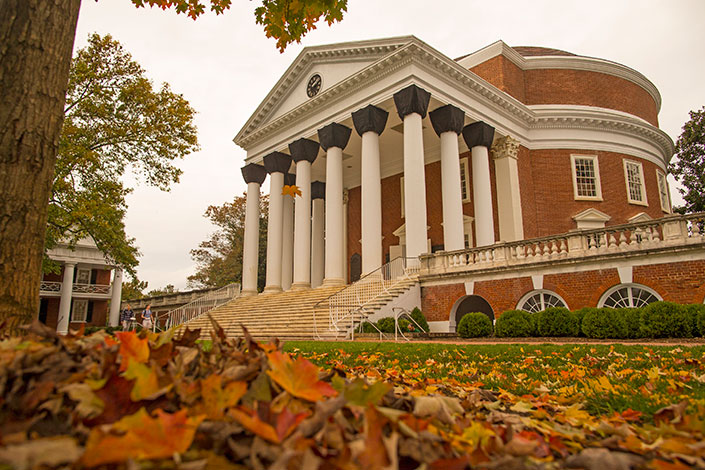University of Virginia President Teresa A. Sullivan and Rector George Keith Martin met Wednesday with faculty members in a town hall discussion focused on next steps for U.Va. on the issues of sexual assault and student safety.
Sullivan told faculty members that the fall semester has been difficult for the entire University community, and thanked them for their continued focus on students and their interest in discussing potential solutions.
“What all of us want for our students is for them to be safe,” Sullivan said at the event organized and hosted by the University’s Faculty Senate. “Physically safe, emotionally safe, mentally safe – safe in every other way.”
The just-concluded academic semester was marked by the disappearance and homicide of student Hannah Graham, intense attention and introspection following publication of a now largely discredited Rolling Stone article, and the deaths of two other students.
“Student deaths are especially tragic for us,” Sullivan said. “Sexual assault is also tragic because it doesn’t just harm the survivor once. The harm can last for a lifetime.”
Martin told faculty members gathered in the Caplin Theater that he and others are often frustrated by what they cannot say due to an ongoing investigation related to the events described in the magazine article, but he also strongly defended the University’s staff responsible for assisting students and handling cases involving sexual assault.
“I personally know their dedication to the University,” he said.
In the wake of the article, Sullivan requested that Charlottesville Police investigate Rolling Stone’s depiction of a horrific rape in 2012 – reporting under scrutiny now that the magazine has conceded contains errors, for which its editors apologized.
Martin also asked the state attorney general to appoint an independent counsel to review the policy, practices and procedures of the University’s handling of sexual assault. Martin told faculty members the work of independent counsel O’Melveny & Myers would be released as a public record, to the extent allowed under federal and state laws regarding student privacy and confidentiality.
“We need to have an objective, outside assessment of our policies and practices, and how we can strengthen student safety on Grounds. The safety of our students is our first and foremost priority,” Martin said in a statement released after the faculty session. “We stand ready to take decisive action based on what we learn, and to share that with our University community.”
Sullivan also outlined early efforts of the recently appointed Ad Hoc Group on University Climate and Culture. The group is charged with exploring policies, practices and organizational structure, as well as the resources necessary to support the ultimate goal of providing an outstanding education while ensuring the safety and well-being of students. A separate administrative task force is charged with implementing the advisory group’s recommendations.
Some early recommendations already are in place or in motion, including the hiring of additional counseling and trauma response personnel in the Maxine Platzer Lynn Women’s Center and in U.Va.’s Counseling and Psychological Services. Next semester, students will see a new police substation serving the Corner area, and increased patrols. Also planned are enhancements to on-Grounds lighting and improvements to the University’s camera system.
Sullivan said the ad hoc group will include three working groups focused on prevention, response and culture. Progress will be tracked in the short-, medium- and long-term.
Faculty Senate Chair Joe Garofalo said University faculty had responded robustly to the recent events and to the call for a review of U.Va.’s culture and practices.
“You all want actions to be taken to make this a safer place,” he said.
During the extended question-and-answer period, faculty members shared a number of ideas on potential areas of emphasis. Some spoke forcefully about U.Va.’s oversight of Greek life, and others urged the president and rector to place as much emphasis on education and prevention as on adjudication or processes that follow incidents and complaints.
School of Law professor Anne M. Coughlin urged the audience and University leadership to also focus on advocating change in Virginia rape laws, which she said are antiquated and, by their structure and language, can make it difficult to successfully prosecute cases.
“We cannot protect our students until we have a criminal code that does that,” she said.
Martin encouraged faculty members to continue to engage in the discussion and submit recommendations.
“This is obviously an opportunity for the University of Virginia to be a national leader, and I don’t say that lightly. This is a very serious subject,” Martin said. “President Sullivan has done a tremendous job in a short period of time. We support her, and we are working as a team, and we thank you for your contribution helping the University address this very critical issue.”
Media Contact
Article Information
December 17, 2014
/content/uva-president-rector-discuss-path-forward-during-faculty-town-hall

